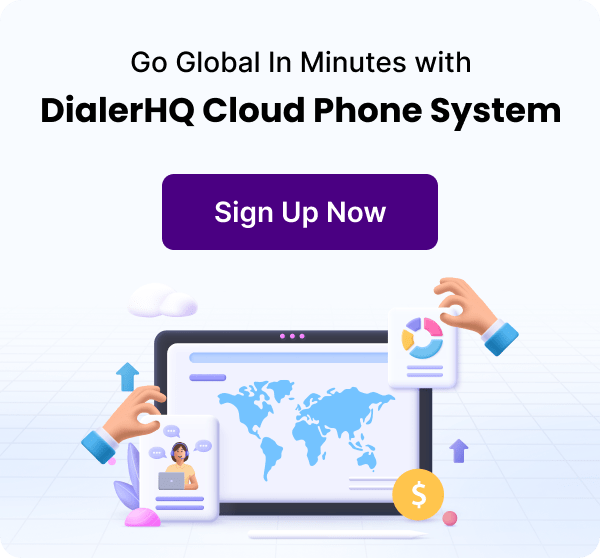Senior Writer: Paras Kela
Do you want to automate routine tasks and deliver personalized experiences to save time and improve customer service? We recommend you should, especially when 94% of customers are likelier to keep purchasing after receiving positive customer service. Artificial intelligence in call centers can help you with exactly that.
That’s why we have brought you this useful guide on artificial intelligence in call centers with its types, working mechanisms, and benefits. Scroll through to find the best practices for implementing AI call center software.
What is Contact Center AI?
Contact Center AI is a machine-learning solution that aims to improve and automate different call center functions by leveraging machine learning and artificial intelligence. With this solution, you can expect streamlined and optimized business processes. Its high-utility feature stack can transform how your customer service representatives and contact center leaders work.
Inefficient agents, poor customer experience, and low-grade data can adversely affect your business. Call center AI can change that while making your agent's and supervisor’s life easier. Implement an AI that fits your business needs, and don’t forget to follow the best practices when you adopt one.
Some of the top contact center AI features are call center transcription, natural language processing, predictive analysis, sentiment analysis, and call analytics.
Types of AI in Call Centers
Different kinds of AI in call centers are used to automate different functions, improve agent productivity, deliver a top-notch experience to call center customers, and assist agents in real-time. Here are some major types of AI in call centers –

1. Predictive Call Routing
Predictive call routing directs your call center calls (as per caller’s personality, call history, and communication style) to the most suitable customer service agent (based on their expertise or personality) for an effective and quick resolution.
This call center feature utilizes customer behavior profiles to equip AI with in-depth knowledge about customer behavior and personas, making the customer experience personalized. And why is that needed? Because, well, 63% of customers prohibit buying from brands with unsatisfactory personalization strategies.
2. Interactive Voice Response
Interactive voice response (IVR) is one of the most popularly used AI in call centers that you must’ve interacted with at least once in your lifetime during your customer service experience. Yes, it is the one where you have to key in your preferred language, name, or account number on the dial screen based on your answers to the recorded questions.

IVR is a game changer if you receive tons of routine calls about pre-defined questions that do not require human customer support executives. Its 24*7 availability quickly handles customers’ initial queries and significantly saves agents’ time.
3. Conversational AI
Conversational AI or chatbots are AI-powered self-service online chat options to receive customer service. Chatbot is an important part of call centers because it can complete 70% of conversations, lowering call volumes and saving agents time and effort.
Customers can engage with your website and access self-services without needing agents to answer repetitive questions, facilitating instant query resolution.
4. Emotional intelligence
Emotional intelligence AI in a call center AI solutions designed to track customer sentiment of active phone calls. It is well-trained to gauge and analyze different voice tones, cultural styles, and languages to determine the caller’s mood. This AI also analyzes the sales rep’s tone and the number of agent interruptions during the conversation.
After in-depth analysis, it gives agents live feedback (popup messages) so they know the real customer mood and take relevant action. This is known to improve customer service as it enables agents to handle customer calls as per the customer’s mood.
5. Call Analytics
Call center analytics is another major call center AI type that call centers extensively use to extract critical analytics like first resolution and call times. These analytics provide trends and insights into customer data to easily distinguish between positive and negative customer experiences so your agents can improve accordingly.
These analytics are meaningful and reliable because they consider customer tone, personality, and sentiment before producing results.
How does Contact Center AI Software Work?
AI in contact centers performs various functions and works towards helping you deliver the best customer service. Let’s understand how contact center AI solutions work –

1. Smart Call Routing
AI in contact centers first evaluates what customers say or input initially during calls via Natural Language Processing (NLP). It then gauges the customer’s goals and routes the call to the best-suited and available agent or department based on expertise and past customer interactions.
2. Self-Service Automation
Next comes the automation of some customer service elements via Interactive Voice Response or chatbot. These AI contact center solutions are equipped with information to instantly respond to repetitive questions and resolve queries via self-service.
This saves agents time and effort, letting them focus on complex issues. The best part? This AI learns and sharpens self-service skills by analyzing user interactions.
3. Voice Biometrics
This artificial intelligence in call centers detects, recognizes, and validates callers’ voice patterns. The core aim of voice biometrics is to improve the degree of security via user authentication. You can also use it to determine customers who call frequently and instantly provide call center agents with client or customer journey history for better query resolution.
4. Persistent Improvement and Learning
AI contact center solutions constantly learn and improve the quality of their answers based on various inputs via machine learning techniques. Using this technique, AI better understands customer intentions by analyzing different customer interactions, accessing training data, and agent feedback.
It also makes sentiment and speech analysis more accurate while ensuring it is always updated with current customer demands or preferences.
5. AI-assisted Reviews and Speech Analytics
AI speech analytics evaluates all customer-agent call recordings and transcripts them to better review performance and state whether the agent has met QA scorecard criteria.
You don’t have to barge into random agent-customer calls to review their performance, which might derive biased results due to a bad call choice.
What are the Benefits of AI in Call Centers?
After understanding how contact center AI solution works, it’s essential to know how artificial intelligence in call center can benefit your business. Here are 4 major benefits of AI in call centers –

1. Relentless and Instant Customer Service
Customers strongly dislike long wait times or slow responses and might even churn if subjected to the same. That’s when AI comes to the rescue. It helps you deliver instant customer support 24/7 via automated chatbots, smart call routing, and call queueing.
It ensures that all customer queries are appropriately catered to without incurring additional call center costs for hiring human agents.
2. Reduced Agent Effort
AI call centers diverts incoming calls to the right chatbot or agent. Even when it directs calls to human agents, it acquaints them with customer-specific data such as query nature, ideal answers, and past interactions. Hence, your agents never have to dig for individual customer information and can make informed decisions to serve customers with minimal effort.
3. Personalized Experiences
Artificial intelligence easily identifies customer behavior trends to give you a base to forecast customer needs and curate your marketing strategy accordingly. It creates in-depth customer behavioral profiles for agents to extend personalized experiences. Using these profiles, agents can also determine upsell and cross-sell qualified customers.
4. Empowers Agents to Perform Better
Call center AI empowers agents by helping them respond better in different situations. Moreover, it provides agents with live feedback during active calls about the conversation flow and smartly attracts data to help them tackle complex situations more confidently.
You May Also Read : Call Center vs. Contact Center: Key Differences
Best Practices for Implementing Artificial Intelligence in a Call Center
After diving deep into the intricacies of AI based call center, we are sure you must be excited to adopt it into your business. But to achieve its highest results, you must follow the below-mentioned best practices –

1. State Your Objectives Clearly
If you are planning to implement AI in your business, you must not do it because your competitors are doing it or it is in trend. You must do it only with a clear objective – first-call resolution improvement, call volume reduction, or customer satisfaction score enhancement. Clearly defining your objectives will help you adopt the right AI.
2. Check Your Ai’s Integration Capabilities
Your AI must have strong third-party integrations so that you don’t face any issues integrating it with your existing call center software and infrastructure. Integrations also facilitate auto data syncing and sharing so agents can view customer insights in one place, improving efficiency.
3. Train Your Agents Well
The main users of your AI are your agents and supervisors, who need training to leverage the implemented AI well. You may even experience some resistance from your agent’s end about the newly adopted AI, which may be because they are occupied with catering to high-priority tasks.
They’d feel like they lack time to learn using the AI, but you can easily ease the resistance by supporting them throughout their training.
4. Monitor and Optimize Your Processes
Your work doesn’t end with adopting a great AI for contact center; rather, it extends to checking how successful it is and the value it brings. For that, you must define some metrics like change in agent efficiency, customer feedback, and shift in overall productivity. So, choose your metrics, gauge areas of inefficiencies, and modify your strategy based on the result.
Wrapping Up
As we have finally reached the end of this extensive yet helpful guide, we hope you have a better understanding of modern call center operations and call center AI now. You must carefully analyze your processes to determine which tasks an AI can cater to better while maximizing profit and reducing manual efforts.
Don’t forget to check out your contact center’s features to ensure they match your business needs well. Now that you’re appropriately armed with the required knowledge to select the best AI for contact center, go ahead and adopt one today!
Frequently Asked Questions
ACD stands for Automatic Call Distribution. ACD systems help businesses automate the process of routing inbound calls to an appropriate agent. ACD systems businesses minimize employee burnout as well as enhance customer satisfaction.
CD technology helps call centers and businesses manage a high volume of incoming calls while minimizing employee burnout. In addition, this helps direct customer calls to agents who are best equipped to handle the call.
For small businesses with a handful of agents, ACD systems help manage large call volumes. In industries like healthcare, hospitality, Edtech, etc. where businesses ought to handle a high volume of calls at each step of the process, from service inquiry to billing, ACD systems prove to be effective and advantageous.
PBX stands for Private Branch Exchange and allows employees to make and receive calls. ACD stands for Automatic Call Distribution, and it helps contact centers and businesses distribute and route incoming customer calls.

Paras Kela is an accomplished IT professional with 7+ years of industry experience, including 4+ years as a dedicated content writer. His expertise lies in crafting informative blogs on VoIP and cloud telephony, among other technical subjects. Outside his professional pursuits, he cherishes quality time with loved ones, indulges in watching documentaries, and finds solace in gardening.
Updated : April 17, 2024

Subscribe to our newsletter & never miss our latest news and promotions.





